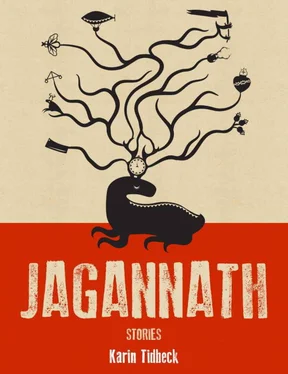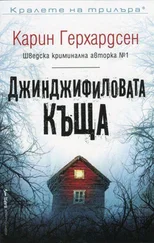It was knotted and dusted with soil, knees and elbows worn shiny. It was perhaps four inches tall. It made no resistance as you bent down and picked it up, lifted it into the kitchen and put it down on the table. You looked at each other for a while. Then you said:
“Did I grow you?”
It nodded in reply.
It was seemingly a sexless creature, but thin and crooked as it was, it looked like an old man. You simply named him Brown, and you made a bed for him in a blue flowerpot in the kitchen window.
Brown either couldn’t speak or chose not to. He was a quiet presence who seemed content to sit among the plants in the kitchen window. He would climb down to sit on the kitchen table when you ate. He disappeared under the dirt in the blue flowerpot whenever you had visitors.
I wrote some stuff about how Brown seemed to have a personal relationship with each of the plants in your flat and on the balcony. He made his rounds every day, patting stems and leaves, sometimes just sitting still among the roots. In spring, little buds sprung out on his shoulders and elbows that bloomed in time for midsummer. During winter, he hibernated in the flowerpot.
I wrote about when you moved from Hökarängen to another suburb west of Stockholm, and how Brown almost died because the transition was so difficult. And there the text ended. I didn’t know what to write, how to make the story come together. Where would it end? Would Brown stay with you the rest of your life? Would he ever be discovered by someone else? If someone moved in with you, how would he be able to stay hidden? To answer all these questions I would have to invent your future life. Your career. Your travels. A partner, maybe more. This is easy enough with a fictitious person, but you were very real, and my friend. Who was I to decide what you would do for a living, what kind of people you would come to love? I ended up being so afraid of doing something wrong, as if I were about to force you into a literary arranged marriage, that I stopped writing in the middle of the move from Hökarängen and Brown’s imminent death.
We know now how things ended up, of course. Alice’s gentle siesta snores reach out into the living room. Your paintings cover the walls. Brown’s presence, I say, must have either gone unnoticed, or he’s become a family secret. Of course, I didn’t think you’d ever share your life with someone who couldn’t handle the existence of someone like Brown.
You’re still listening, uncharacteristically quiet. When I say these last things, you smile at me – that very Finnish smile that makes you look so much like your mother, slanted eyes almost disappearing into the folds of your face. You chortle at me.
“I know, I know,” I say. “But what the hell was I supposed to do? You of all people know I can’t stop making things up.”
You burst into laughter. You stand up and walk over to the window, where you lift an upside-down flowerpot. A tiny, gnarled creature lies curled up on a folded woollen sock. It seems to be asleep. I can see its tiny ribcage moving.
“Brown,” you say. “What a name.”
The outline of Rebecka’s body is light against the scorched wall, arms outstretched as if to embrace someone. The floor is littered with white ashes. Everything else in the room looks like it did before. A kitchen table with a blue tablecloth, a kitchenette stacked with dirty dishes. A wrought iron bed, which I am strapped to.
I ended up here because I was Rebecka’s only friend. As such, I used to clean up after her half-hearted suicide attempts: blood from shallow wrist cuts; regurgitated benzos and vodka; torn-out overhead light sockets and doorjambs that wouldn’t hold her weight. She would call me in the wee hours of the morning: Get over here, help me, I tried again, I screwed up… and I would go over there to nurse her and hug her, again and again. What was I supposed to do? I wanted to tell her to do something radical—jump from the West Bridge, throw herself in front of a train – just to get it over with. But I didn’t have the heart. I don’t know why I remained her friend. It’s not like I got anything out of it. It was the worst kind of friendship, held together by pity.
I remember the phone conversation we had the day before her first suicide attempt. It was a slushy Saturday in March. I was in my pajamas on the sofa, watching two sparrows fight over a lump of tallow that hung from the balcony rail. We were talking about something inconsequential, clothes and sizes I think, when she suddenly changed the subject.
“The Lord,” Rebecka said over the phone.
“Hallowed be His name,” I said reflexively.
“Sure. The Lord,” she said. “He punishes people, right?”
“Is that a trick question?” I said.
She was quiet for a moment. Then: “I did something.”
“What?”
“I went to the Katarina Church and spit in the baptismal font.”
“You did what?” I must have shouted; the birds took off.
“Spit in the baptismal font. I thought that might get His attention.”
“Rebecka, that’s insane. People have been fried on the spot for doing stuff like that.”
“Yeah, that was sort of the point, wasn’t it.”
“So what happened?”
“Well, He showed up.”
I waited for her to say she was just pulling my leg, but she said nothing, just breathed down the line. “He showed up? How?”
“Uh,” she said, “it was really bright. I had to cover my eyes.”
I looked outside. Melting icicles on the windows and rain gutters that glittered in sunlight unbearably bright after the foggy Stockholm winter. “Uh-huh,” I said.
“But He said He was okay about the font,” she continued. “He said that some people have to be allowed more mistakes than others. That they’re damaged and don’t understand.”
“Did you get a chance to ask Him about the other stuff?”
“No. He left after that. I’ll have to come up with something else.”
“Rebecka,” I said, “you can’t make Him change His mind.”
“I just don’t want to feel like shit. Is that too much to ask?”
“We can’t expect Him to take care of everything,” I said. “After all, we had to take care of ourselves before He came back.”
“But there were psychologists then,” she said.
“Yes.”
“And there aren’t anymore.”
“No, I guess not.”
“Because He cures everyone and… how was it… ‘lifts the darkness in every soul.’ Except me. So what am I going to do?”
“I don’t know. Maybe it’s a task you have. A test.”
“I already went through my damned test. I can’t deal with all this crap.” She hung up.
The string of attempts with pills, razor blades, and ropes started after that. She would call me after every attempt. I took her to the hospital the first few times. After making sure she didn’t have any life-threatening injuries (and she never did), they sent her home with a priest in tow. Eventually, Rebecka wouldn’t call me until a day or so after she’d done something. Then I’d visit to clean up the mess while she hid in her bed.
The Lord tells us we must have patience with our fellow men, especially those who are being tested. Rebecka was being tested. Around the time when I had just met her, she had been raped and tortured by her husband, rest his soul. She had never recovered.
“People who hurt others are the ones with the best imagination,” Rebecka said.
We were walking along the quay from Old Town to Slussen, watching the commuter boats trudge across Lake Mälaren. It was November. There were no tourists waiting for the boats this time of year, just some pensioners and a kindergarten group in bright snowsuits. I didn’t mind the cold, but Rebecka was bundled up. We each had a cup of coffee, Rebecka occasionally pulling down her scarf from her face to take a sip. I couldn’t help but look at her scarred lips as she did so.
Читать дальше












![Карин Тидбек - Аматка [ЛП]](/books/438406/karin-tidbek-amatka-lp-thumb.webp)